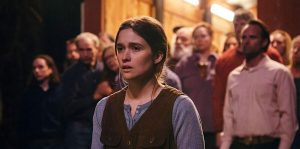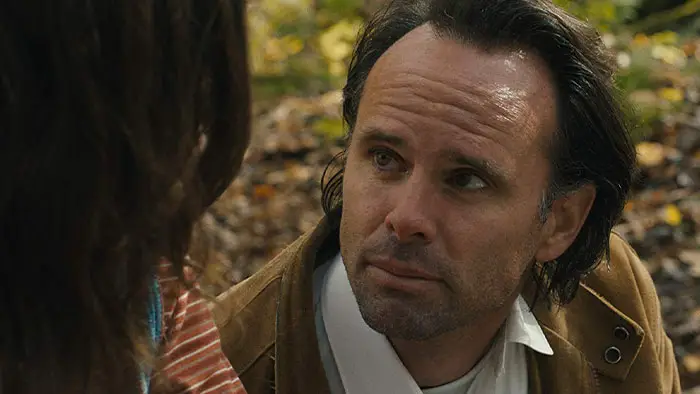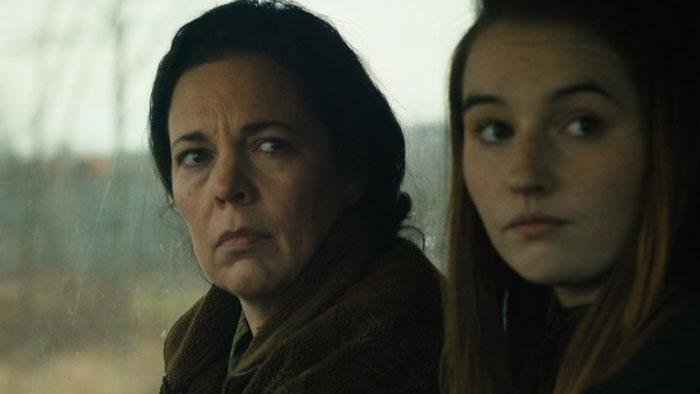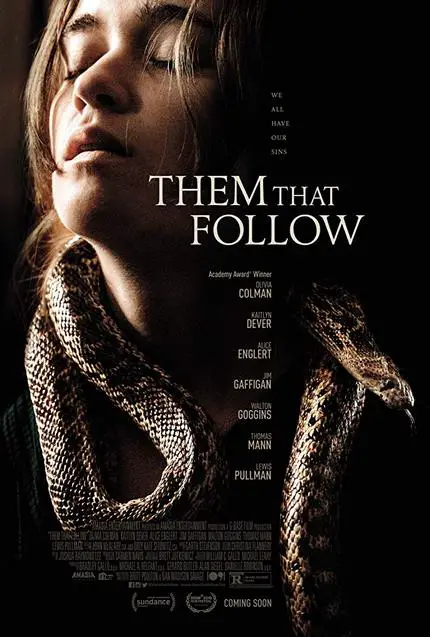
Britt Poulton and Dan Madison Savage’s Them That Follow follows on the heels of Ari Aster’s excellent mind-f**k Midsommar. Both films deal with religious sects that worship deities of their own creation. Those communities exist on society’s fringes, functioning as harbors of lost souls that seek absolution or acceptance. While Midsommar was a brazen, sun-scorched descent into dementia, Them That Follow is more of a slow-burn drama, taking its time to gradually build tension and lure us into the slithering pits of a little-understood sub-sub-culture.
The film takes place in a remote Appalachian serpent-worshipping community, led by the crazed pastor Lemuel (Walton Goggins). When he’s not busy preaching, he leads the town folk on dangerous rattlesnake-hunting expeditions. They deem the reptiles celestial, you see. Lemuel’s daughter Mara (Alice Englert) is prepped to marry the pastor’s protégé, the quite-literally enraptured Garret (Lewis Pullman) – only there’s a small caveat. Mara is secretly pregnant, and the child belongs to the rebellious Augie (Thomas Mann), who is planning to escape the cult. Things get complicated when Augie’s mother, the devout snake worshipper Hope (Olivia Coleman), finds out about the infidelity.

“…in a remote Appalachian serpent-worshipping community, led by the crazed pastor Lemuel.”
“There’s nothing for me here,” Augie tells a heartbroken Mara. When he realizes that leaving the community isn’t feasible for his sweetheart, Augie pretends to have a swift change of heart and valiantly goes through the “snake baptism” ceremony, wherein he gets bitten. Instead of taking him to a hospital, which would endanger the whole clan, Lemuel entrusts the serpent gods to heal him. As Augie gradually deteriorates under the care of an increasingly-conflicted Hope, Mara has to decide whether she holds her human values above her loyalty to the “family”.
Poulton and Savage depict a bizarre, alien world – a world where women make quilts that signify their future, while men hunt serpents; a tiny microcosm that abides by its own laws and acts as salvation for the weak, the broken, the lonely, the outcast. In certain ways, it mirrors our own narrow-minded-yet-brash society, the filmmakers making sure their allusions are clear. “You know how females are,” Garett intones nonsensically, right after Mara hastily leaves the dinner table. “Always getting around on about something.” The filmmakers examine how difficult it is to break deeply-embedded bonds, to escape from the only past you know, to see through the veil and recognize the bigotry and general insanity of your own people, the only family you know.

“…Coleman is fabulous…her seemingly-cold character repressing turbulent emotions.”
Most crucially, Poulton and Savage assembled a stellar cast that keeps the film from sliding into a swampy mess of unintentionally-laughable hysteria. Olivia Coleman is fabulous, per usual, in total command of every scene, her seemingly-cold character repressing turbulent emotions. ”Can’t seem to get rid of the damn things,” she comments dryly about her smoking habit, before stating with utter conviction: “My only vice.” Alice Englert impresses in a purposefully reticent performance, at least until that final scene, where she allows herself to truly feel. Kaitlyn Dever displays a 180-reversal from her recent, hilarious lead role in Booksmart as the shy, damaged Dilly, who gets “adopted” into Mara’s “family”. As for Walton Goggins – well, he was born to play this part, stealing every scene he’s in. Despite the veneer of confidence, his Lemuel clings to the society he’s established with even more rigor than his followers. He doesn’t so much proclaim “Amen!” during his ceremonies as ask for the others’ acceptance.
Basked in amber autumn hues, supplemented by Garth Stevenson’s excellent score, Them That Follow is a dark and richly atmospheric experience. Despite its missteps, this is one snake-infested cinematic pit worth investigating.

"…lures us into the slithering pits of a little-understood sub-sub-culture."
